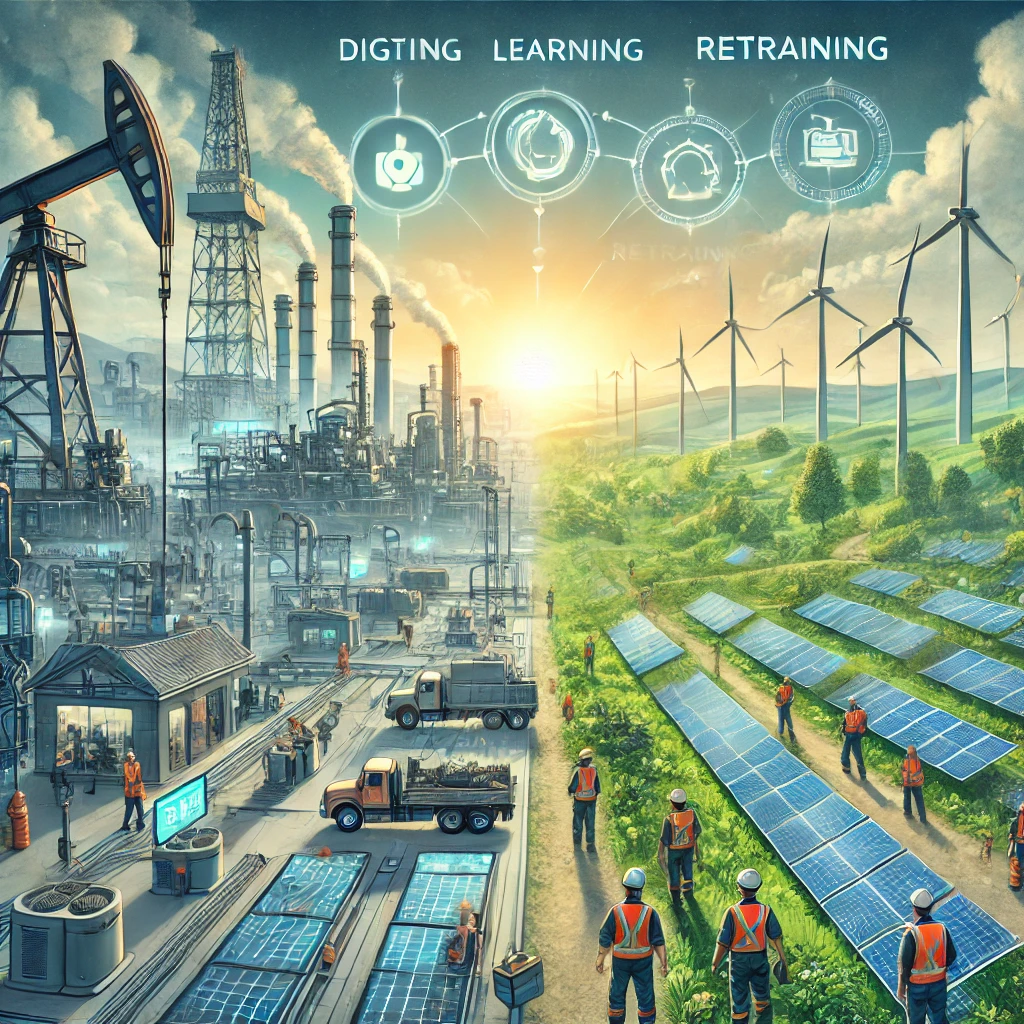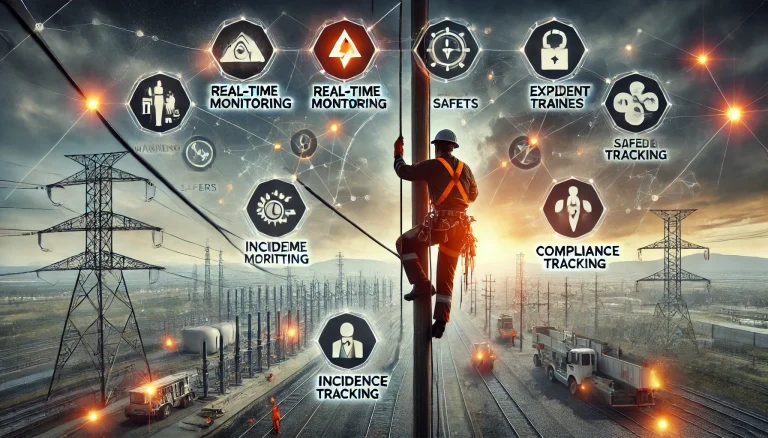Problem Statement:
The global energy sector is undergoing a transformative shift as renewable energy sources like wind, solar, and hydrogen gain prominence. However, this transition poses a significant challenge, particularly in terms of workforce skills. Workers in the oil and gas industry have specialized expertise in areas such as drilling, refining, and pipeline management, skills that may not directly transfer to the renewable energy sector.
As the demand for renewable energy grows, companies must invest in retraining and education programs to equip their workforce with the necessary skills for new roles in clean energy. This transition is not just about technology; it’s about people and their livelihoods. The process of reskilling the existing workforce can be costly and time-consuming, requiring collaboration between industry, governments, and educational institutions. If not managed properly, the shift could lead to significant job losses, economic disruption, and social challenges, especially in regions that are heavily dependent on fossil fuel industries for employment and economic stability.
In light of these challenges, a proactive approach to workforce transition is essential. By investing in retraining and skill development, companies can ensure a smooth transition that benefits both workers and the broader economy, while also supporting the global move towards a more sustainable energy future.
Pain Points:
- Skill Mismatch: The specialized skills of oil and gas workers do not directly align with the requirements of the renewable energy sector, creating a significant skills gap.
- High Retraining Costs: The financial burden of retraining workers in new technologies and methodologies for renewable energy is substantial.
- Time-Consuming Transition: Retraining and education programs require time, potentially delaying the deployment of renewable energy projects.
- Job Losses: Without proper retraining, workers in fossil fuel industries face the risk of unemployment, leading to economic hardship in affected regions.
- Regional Economic Disruption: Regions dependent on oil and gas industries for economic stability could experience significant disruption during the transition to renewable energy.
- Resistance to Change: Workers and companies entrenched in traditional energy sectors may resist transitioning to new industries due to uncertainty and fear of the unknown.
- Limited Access to Training Programs: In some regions, access to quality retraining and education programs is limited, making it difficult for workers to transition to new roles.
- Lack of Policy Support: Inconsistent or inadequate government policies and incentives can hinder efforts to retrain the workforce and support the transition to renewable energy.
- Uncertain Job Market: The renewable energy sector is still evolving, and job opportunities may be uncertain, making it difficult for workers to commit to retraining.
- Impact on Local Communities: The social fabric of communities dependent on fossil fuel industries may be strained as workers face uncertainty about their future roles and livelihoods.

Future Vision:
- Comprehensive Retraining Programs: Industry-wide retraining programs equip oil and gas workers with the skills needed for new roles in the renewable energy sector.
- Government and Industry Collaboration: Strong partnerships between governments, industry leaders, and educational institutions support the workforce transition with funding, policy support, and training resources.
- Job Creation in Renewable Energy: The growth of the renewable energy sector creates a wide range of new job opportunities, from engineering to installation, making the transition appealing to workers.
- Localized Training Centers: Training centers are established in regions historically dependent on fossil fuels, providing easy access to reskilling programs for local workers.
- Digital Learning Platforms: Online education platforms offer flexible, scalable training solutions, allowing workers to learn at their own pace and from any location.
- Cross-Industry Certification: Certifications recognized across both fossil fuel and renewable energy industries ensure workers have portable, in-demand skills.
- Economic Diversification: Regions historically reliant on oil and gas diversify their economies by developing industries around renewable energy, technology, and services.
- Public Awareness Campaigns: Awareness campaigns highlight the benefits of the transition to renewable energy, reducing resistance and fostering a culture of continuous learning.
- Global Workforce Mobility: Workers are encouraged and supported to move to regions with high demand for renewable energy skills, balancing global job markets.
- Sustainable Transition Plans: Companies and governments implement detailed transition plans that minimize economic disruption while maximizing opportunities for workers.
Use Cases:
- Retraining Oil Rig Workers for Offshore Wind: Programs that retrain offshore oil rig workers to install and maintain offshore wind turbines.
- Transitioning Drilling Engineers to Geothermal Energy: Drilling engineers learn to apply their skills in geothermal energy projects, such as drilling wells for geothermal heat extraction.
- Solar Technician Training for Pipeline Workers: Pipeline workers are trained to become solar installation technicians, utilizing their experience with large-scale infrastructure projects.
- Energy Storage System Installation for Electricians: Electricians in the fossil fuel industry are trained to install and maintain battery storage systems for renewable energy.
- Hydrogen Fuel Cell Technology Training for Refinery Workers: Refinery workers receive training in hydrogen fuel cell technology, preparing them for roles in hydrogen production and distribution.
- Renewable Energy Project Management for Oil and Gas Executives: Senior executives undergo training in renewable energy project management, helping them lead the transition within their companies.
- Community College Programs for Renewable Energy Careers: Community colleges in oil-dependent regions offer specialized programs in renewable energy technologies, targeting local workers.
- Wind Turbine Maintenance Training for Mechanical Engineers: Mechanical engineers from the oil and gas industry transition to roles in wind turbine maintenance and operations.
- Green Building Certification for Construction Workers: Construction workers in fossil fuel regions are certified in green building practices, opening opportunities in sustainable construction.
- Agricultural Biomass Energy Production for Farmers: Farmers receive training in biomass energy production, allowing them to diversify their income by producing renewable energy from agricultural waste.
Target Users and Stakeholders:
Target Users:
- User Group: Workers and professionals currently employed in the oil and gas industry
- Age Group: 25-55 years old
- Gender: M/F
- Usage Pattern: Regular participation in retraining programs, career counseling, and job placement services; engagement with online learning platforms
- Benefit: Users acquire new skills that open up opportunities in the renewable energy sector, ensuring continued employment and career growth.
Stakeholders:
- Energy Companies (Oil & Gas and Renewables):Role: Implement retraining programs, invest in workforce development, and lead the transition to renewable energy.
- Government Agencies: Role: Provide funding, create supportive policies, and offer incentives for companies and workers to transition to renewable energy jobs.
- Educational Institutions: Role: Develop and deliver training programs that equip workers with the skills needed for new roles in renewable energy.
- Labor Unions: Role: Advocate for worker rights, ensuring fair treatment and opportunities during the transition to renewable energy.
- Local Governments: Role: Support local workforce development initiatives and provide resources for economic diversification in fossil fuel-dependent regions.
- International Organizations: Role: Offer financial and technical assistance to support the global workforce transition to renewable energy.
- Training Providers and Consultants: Role: Develop specialized training programs and provide expertise in workforce transition strategies.
- Renewable Energy Industry Associations: Role: Advocate for policies that support workforce transition and promote best practices within the industry.
- Workers and Job Seekers: Role: Participate in retraining programs, embrace new career opportunities, and adapt to the changing energy landscape.
- Local Communities: Role: Support the transition by engaging in community development projects and diversifying local economies.
Key Competitors:
- Shell: Shell has been actively investing in renewable energy and workforce retraining programs to transition its employees to new roles in clean energy sectors.
- BP: BP is focusing on becoming a net-zero company by 2050, investing in renewable energy projects and reskilling programs for its workforce.
- Equinor: The Norwegian energy company Equinor is transitioning from oil and gas to offshore wind, with comprehensive retraining initiatives for its workforce.
- TotalEnergies: TotalEnergies is diversifying its portfolio into renewables and has launched multiple workforce transition programs to support its employees.
- Enel: Enel, an Italian multinational energy company, is expanding into renewable energy, with a focus on training its workforce for new roles in the clean energy sector.
Active Startups:
- Evergreen Energy: Provides training and consulting services for workforce transition in the renewable energy sector.
- Renewable Academy (RENAC): Offers online and on-site training programs for professionals transitioning to the renewable energy industry.
- Solar Energy International (SEI): Specializes in solar energy training, helping workers from traditional energy sectors transition to solar-related roles.
- Ecotech Institute: Focuses on providing degree programs in renewable energy, targeting students and workers looking to enter or transition into the clean energy field.
- Clean Energy Leadership Institute (CELI): Provides leadership training and career development programs for professionals transitioning to the renewable energy sector.
- Empower Energy Solutions: Develops customized training programs for companies and workers transitioning from fossil fuels to renewables.
- Wind Empowerment: Focuses on training for small wind turbine manufacturing and maintenance, providing opportunities for workers in the energy transition.
- Future Energy Associates: Offers consulting and training services to help companies manage workforce transitions to renewable energy.
- GridLab: Provides technical training and support for workers transitioning to roles in smart grid and renewable energy integration.
- NEXTracker Training Center: Offers hands-on training for solar energy installation and maintenance, targeting workers transitioning from traditional energy sectors.
Ongoing Work in Related Areas:
- Reskilling Initiatives by Major Energy Companies:
- Shell, BP, and TotalEnergies are leading reskilling initiatives, investing in training programs that prepare their workforce for roles in renewable energy projects such as offshore wind, solar power, and energy storage.
- Government-Sponsored Workforce Development Programs:
- Governments in regions heavily dependent on fossil fuels are launching workforce development programs to provide training in renewable energy technologies, focusing on retraining workers for new roles in clean energy sectors.
- Online Learning Platforms:
- Platforms like Coursera, Udacity, and edX are expanding their offerings to include specialized courses in renewable energy, targeting workers looking to transition from the fossil fuel industry.
- Partnerships Between Energy Companies and Educational Institutions:
- Energy companies are partnering with universities and technical colleges to develop tailored training programs that address the specific needs of transitioning workers.
- International Cooperation for Workforce Transition:
- Organizations like the International Renewable Energy Agency (IRENA) are working with governments and companies to support workforce transition through funding, policy advice, and technical assistance.
Recent Investments:
- Shell: In 2022, Shell invested $100 million in a global workforce transition initiative, partnering with universities and technical colleges to retrain employees for roles in renewable energy.
- BP: BP announced a $50 million investment in 2023 to fund retraining programs focused on offshore wind and solar energy, targeting its workforce in Europe and North America.
- Equinor: Equinor committed $75 million in 2022 to reskilling its employees, particularly in regions where it is expanding its offshore wind operations.
- TotalEnergies: TotalEnergies invested $60 million in 2023 in workforce transition programs, with a focus on developing skills in hydrogen production and solar energy.
- Enel: Enel allocated $40 million in 2022 to retrain its workforce for roles in smart grid management and energy storage, supporting its transition to a renewable energy-focused company.
- Evergreen Energy: In 2023, Evergreen Energy raised $10 million to expand its consulting and training services, helping companies transition their workforce to renewable energy.
- Clean Energy Leadership Institute (CELI): CELI received a $5 million grant in 2022 to develop leadership training programs for professionals transitioning to the renewable energy sector.
- Solar Energy International (SEI): SEI secured $8 million in 2023 to expand its solar training programs, targeting workers transitioning from the oil and gas industry.
- Future Energy Associates: Future Energy Associates raised $7 million in 2023 to develop new consulting services focused on workforce transition strategies for large energy companies.
- NEXTracker Training Center: NEXTracker invested $6 million in 2022 to expand its hands-on training programs for solar installation, targeting workers from traditional energy sectors.
Market Maturity:
The market for workforce transition in the energy sector is still emerging but is gaining momentum as more companies recognize the need to reskill their workforce for the shift to renewable energy. The demand for skilled workers in renewable energy is increasing rapidly, driven by global commitments to reduce carbon emissions and transition to sustainable energy sources. As a result, the market for retraining and education programs is expanding, with new startups and educational institutions entering the space to meet this growing need.
However, the market faces challenges, including the high cost of training programs, the time required to reskill workers, and the uncertainty of job opportunities in the evolving renewable energy sector. Governments and industry leaders are beginning to address these challenges by investing in workforce development and creating policies that support the transition. Overall, the market is on a positive trajectory, with increasing recognition of the importance of managing the workforce transition effectively to ensure a smooth and sustainable shift to renewable energy.
Summary:
The transition from fossil fuels to renewable energy is a critical shift for the global energy sector, but it presents significant challenges in terms of workforce skills. Workers in the oil and gas industry possess specialized skills that may not directly transfer to the renewable energy sector, creating a skills gap that must be addressed to ensure a smooth transition.
Companies are investing heavily in retraining and education programs to equip their workforce with the skills needed for new roles in renewable energy. These programs are essential to prevent job losses and economic disruption in regions heavily dependent on fossil fuel industries. However, the process of reskilling workers can be costly and time-consuming, requiring collaboration between industry, governments, and educational institutions.
Recent investments by major energy companies like Shell, BP, and TotalEnergies highlight the growing recognition of the need to manage the workforce transition effectively. Startups and educational institutions are also playing a critical role in providing the necessary training and support.
The market for workforce transition is still emerging but is poised for growth as the demand for skilled workers in renewable energy continues to rise. With the right investments and policies in place, the transition can be managed in a way that benefits both workers and the broader economy, ensuring a sustainable and prosperous future for all.
Would you like to proceed with generating a futuristic landscape image based on this information?



